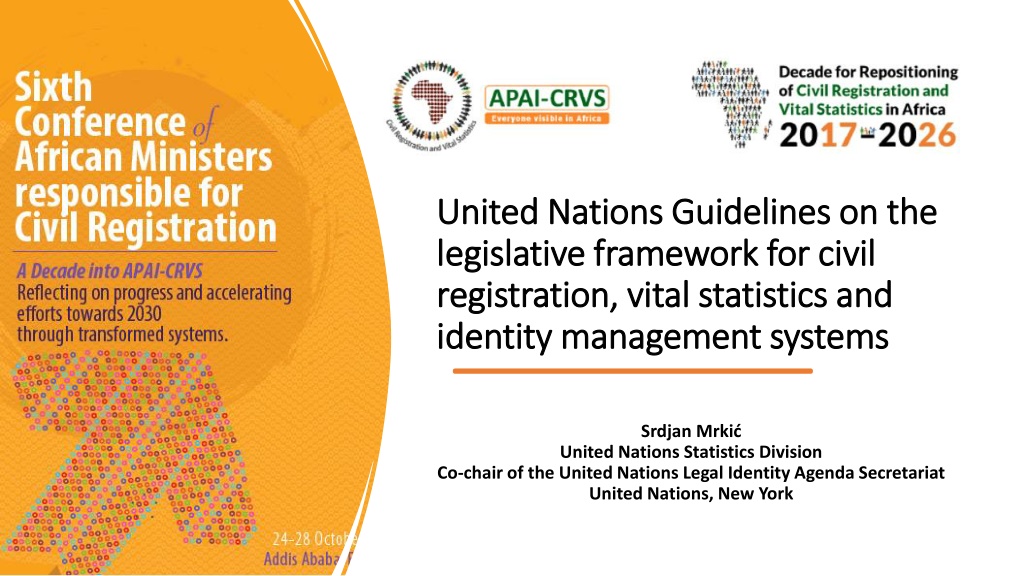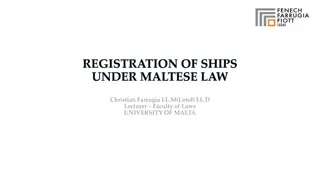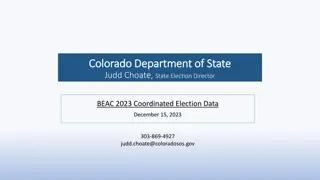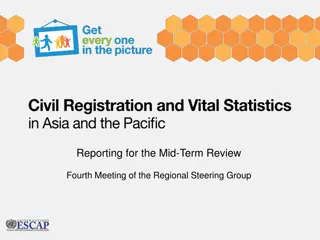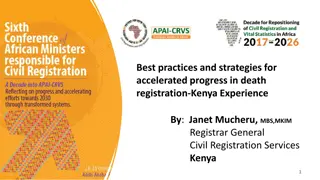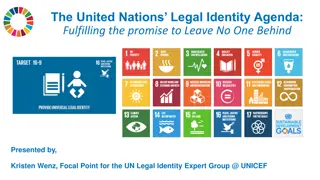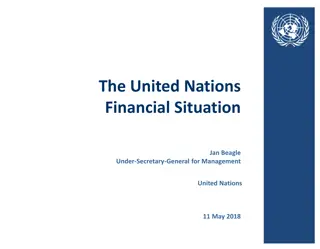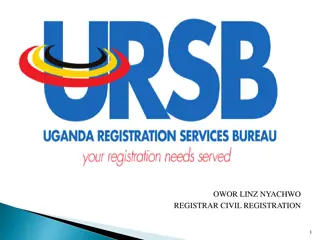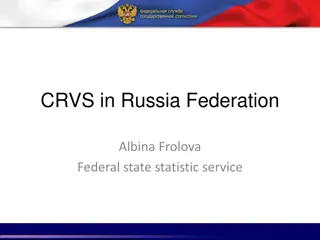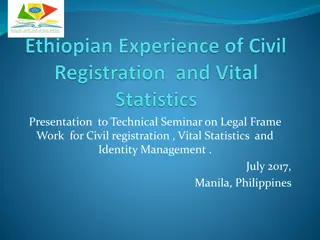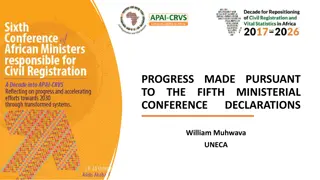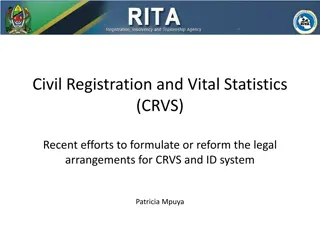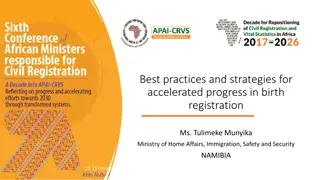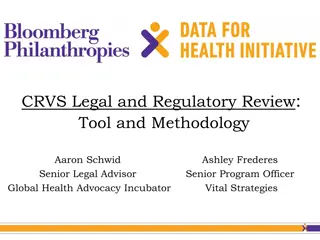United Nations Legal Identity Agenda and Civil Registration Guidelines
The United Nations Legal Identity Agenda aims to ensure legal recognition for all individuals through civil registration systems. This initiative, aligned with the 2030 Agenda for Sustainable Development, emphasizes birth registration and legal identity as fundamental rights. The agenda encompasses the importance of civil registration in establishing legal identity and promoting vital statistics. It also highlights the need for comprehensive identity management systems from birth to death, including interoperability between functions.
Uploaded on May 14, 2024 | 1 Views
Download Presentation

Please find below an Image/Link to download the presentation.
The content on the website is provided AS IS for your information and personal use only. It may not be sold, licensed, or shared on other websites without obtaining consent from the author. Download presentation by click this link. If you encounter any issues during the download, it is possible that the publisher has removed the file from their server.
E N D
Presentation Transcript
United Nations Guidelines on the United Nations Guidelines on the legislative framework for civil legislative framework for civil registration, vital statistics and registration, vital statistics and identity management systems identity management systems Srdjan Mrki United Nations Statistics Division Co-chair of the United Nations Legal Identity Agenda Secretariat United Nations, New York
Content of presentation Content of presentation What is United Nations Legal Identity Agenda UN LIA methodological framework Guidelines on legislative framework
UN Legal Identity Agenda UN Legal Identity Agenda Everyone has the right to be recognized as a person before the law, as enshrined in Article 6 of the Universal Declaration on Human Rights and a number of international human rights instruments To address this, the 2030 Agenda for Sustainable Development established SDG Target 16.9 legal identity for all, including birth registration Civil registration establishes the existence of a person under the law and is fundamental to granting legal identity It is recognized as the ultimate source for production of comprehensive, regular and reliable vital statistics In an effort to increase civil registration coverage worldwide the 2030 Agenda for Sustainable Development established SDG Indicator 17.19.2 proportion of countries that have achieved 100% birth registration and 80% death registration
UN Legal Identity Agenda UN Legal Identity Agenda The UN operational definition of legal identity Legal identity is defined as the basic characteristics of an individual s identity, e.g. name, sex, place and date of birth conferred through registration and the issuance of a certificate by an authorized civil registration authority following the occurrence of birth. In the absence of birth registration, legal identity may be conferred by a legally-recognized identification authority; this system should be linked to the civil registration system to ensure a holistic approach to legal identity from birth to death. Legal identity is retired by the issuance of a death certificate by the civil registration authority upon registration of death In the case of refugees, Member States are primarily responsible for issuing proof of legal identity. The issuance of proof of legal identity to refugees may also be administered by an internationally recognized and mandated authority
UN Legal Identity Agenda UN Legal Identity Agenda The UN Legal Identity Agenda consists of the holistic approach to complete and universal civil registration of all vital events, production of vital statistics, the establishment and maintenance of population registers and identity management apparatus from birth to death, and there should be full interoperability between these functions in a simultaneous manner, according to international standards and recommendations, thus ensuring legal identity for all from birth to death All Member States should adopt and implement this agenda as a systematic and perpetual mechanism for ensuring legal identity for all UN LIA was launched in Rome, May 2019 at a conference dedicated to MDG 16 Officially adopted as internationally recommended model by UN Statistical Commission in March 2020, and subsequently by ECOSOC in June 2020
This model represents a holistic approach to civil registration, vital statistics and identity management recommended by the United Nations, adapted from the United Nations Principles and Recommendations for a Vital Statistics System, Revision 3.; it can be adjusted to national circumstances and governing structures as necessary. Ministry of Health Public health reports Statistics morbidity Health Inf. System Complementary and Interim sources Population census Surveys Live birth Civil Registration NSO - Vital Statistics Health services Certification of cause of death Relatives, midwifes Death Vital Statistics 1.Compulsory 2.Universal 3.Continuous/ Permanent 4.Confidential Compilation Processing Validation Quality control Dissemination Fetal death Civil Informants Registration Authorized institutions Marriage Confers legal identity Additional Sources Coronary Police Pop.Register ID Mgmt. CR DB Vital St. DB Divorce Annulments Courts Judicial separation Population Register Unique ID Access protocols Judicial institutions Administrative/Functional registers Education Employment Tax Social assistance Pensions Voters . Adoption PR DB Legitimation Recognition Informants Identity Management Agency and Services Biometric ID, passports Capture (enrolment) Identification Verification Online and e-services Civil Registration, Vital Statistics and Identity Management System
UN Legal Identity Agenda Methodological Framework UN Legal Identity Agenda Methodological Framework Principles and Recommendations for a Vital Statistics Systems, Revision 3, United Nations, 2014 Handbook on Civil Registration and Vital Statistics Systems: Management, Operation and Maintenance, Revision 1, United Nations, 2018 Guidelines on the Legislative Framework for Civil Registration, Vital Statistics and Identity Management, United Nations, 2019 Handbook on civil registration, vital statistics and identity management systems: Communication for development, United Nations, 2019 Implementation of the United Nations Legal Identity Agenda: United Nations Country Team Operational Guidelines, United Nations, 2020
Legislative guidelines Legislative guidelines Overview of Civil Registration, Vital Statistics and Identity Management Systems Human Rights and Civil Registration, Vital Statistics and Identity Management Systems Institutional Arrangements for Civil Registration, Vital Statistics and Identity Management Systems Legislative Framework Guidelines on the Legislative Framework for Civil Registration, Vital Statistics and Identity Management, United Nations, 2019 General provisions Civil Registration Identity Management The Population Register Vital Statistics Data Protection, Privacy and Security Compliance, Enforcement, Rights and Remedies Other Laws and Policies that Support CRVSID Systems: Incentives, Medical Profession Training and Technology
